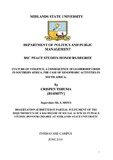Please use this identifier to cite or link to this item:
https://cris.library.msu.ac.zw//handle/11408/4088Full metadata record
| DC Field | Value | Language |
|---|---|---|
| dc.contributor.author | Tshuma, Crispen | - |
| dc.date.accessioned | 2020-12-17T14:02:50Z | - |
| dc.date.available | 2020-12-17T14:02:50Z | - |
| dc.date.issued | 2018-06 | - |
| dc.identifier.uri | http://hdl.handle.net/11408/4088 | - |
| dc.description.abstract | Violence in Southern Africa has become a culture where the end result of most conflicts affecting the region lead either to great suffering or destruction of infrastructure, ecosystems and human life. Southern Africa like the rest of the continent is facing a number of problems such as poor declining economy, political instability, poverty, gender based violence, ethnic and racial rivalry among other issues of concern. The existence of regional organizations like the Southern African Development Community (SADC) and African Union (AU) whose mandate is to integrate and develop the socio-economic and political space of the region has done little if not nothing other than being mere high profile talk shows. The post-independence reality is that violence among Africans in SADC is still rampant as it was during colonization given the xenophobic activities in Zambia and South Africa, with the latter dominating the stage. These xenophobic tendencies are said to be based prejudice and hatred towards selected black foreign nationals which as native groups accuse them of being persistent threats to their rightful entitlements like employment security and economic opportunities among other benefits. Also, given the denial state and misleading sentiments by some South African government personnel. Thus the purpose of this research was to establish poor political leadership as a reason to culture of violence in this context, poor governance by African states has led to xenophobic activities in South Africa. The research work also looked activities that point ills of leadership in different nations. Different schools of thought agree on the notion that Africa is facing challenges of governance which has direct impact to problems affecting the region. Data gathered allowed this work to arrive to conclusions and recommend possible solutions that can be employed to mitigate leadership and governance problems that will ensure successful and development of the SADC region and Africa as a whole. | en_US |
| dc.language.iso | en | en_US |
| dc.publisher | Midlands State University | en_US |
| dc.subject | culture of violence | en_US |
| dc.subject | leadership crisis | en_US |
| dc.subject | xenophobic activities | en_US |
| dc.title | Culture of violence , a consequenceof leadership crisis in Southern Africa : the case of xenophobic activities in South Africa. | en_US |
| dc.type | Thesis | en_US |
| item.grantfulltext | open | - |
| item.cerifentitytype | Publications | - |
| item.openairetype | Thesis | - |
| item.fulltext | With Fulltext | - |
| item.openairecristype | http://purl.org/coar/resource_type/c_18cf | - |
| item.languageiso639-1 | en | - |
| Appears in Collections: | Bachelor of Science Peace Studies Honours Degree | |
Files in This Item:
| File | Description | Size | Format | |
|---|---|---|---|---|
| full dissertation .pdf | Full Text | 1.47 MB | Adobe PDF |  View/Open |
Page view(s)
250
checked on Jan 20, 2026
Download(s)
150
checked on Jan 20, 2026
Google ScholarTM
Check
Items in MSUIR are protected by copyright, with all rights reserved, unless otherwise indicated.



